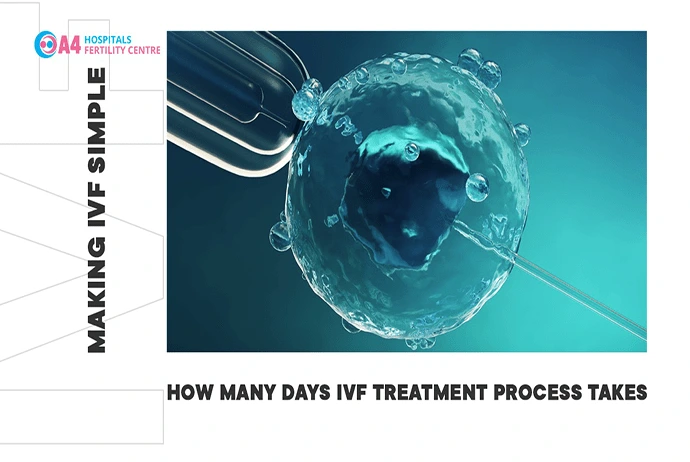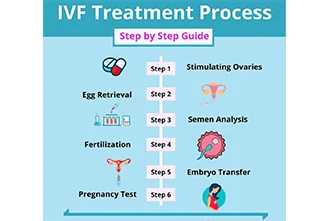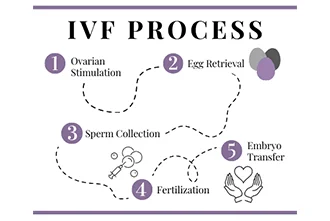
Dr. Aruna Ashok MBBS, MS OG, DNB OG
- Clinical Director

Through In Vitro Fertilisation (IVF) treatments, medical science has come a long way in recent years, giving hope to infertile couples.
IVF is now a widely accepted way for people and couples to have children and live out their dreams of becoming parents.
But many people who want to have children may have questions about how IVF works and how long it usually takes.
In this blog post, we'll go into more detail about IVF methods and explain the IVF process timeline.


Understanding IVF: In Vitro Fertilisation, or IVF, is a type of assisted reproduction in which eggs and sperm are combined outside of the body in a laboratory.
The process starts with hormone pills that stimulate the ovaries and help more than one egg grow.
Most of the time, these medicines are self-administered through injections over the course of 8–14 days, based on the person and the treatment plan.
The next step in the process of vitro fertilization is Ovarian Stimulation. This phase of ovarian stimulation is an important part of IVF treatments.
During this phase, doctors use ultrasounds and blood tests to keep an eye on the woman and figure out when it's time to get the eggs.
The tracking makes sure that the medicine and IVF procedures are working well on the ovaries and that the eggs are developing in the right way. This phase can be short or long, but it usually lasts between 10 and 12 days.
When the eggs have hit the right age, a small surgery called egg retrieval is done.
Most of the time, this is done with sedation or total anaesthesia to make it less painful.
During the process, a thin needle is used to remove the eggs from the ovaries with the help of an ultrasound.
The whole thing usually takes between 20 and 30 minutes, and most people feel better within a few hours.
Once the eggs have been taken out, they are carefully looked at in the lab.
The sample of sperm, which can come from a partner or a donor, is then used to fertilise the eggs.
This can be done in a number of ways, like with traditional IVF or intracytoplasmic sperm injection (ICSI).
The fertilised eggs, now called embryos, are kept in a lab for a few days so that they can grow and develop.
Once the embryos have hit the best stage of development, which usually takes between 3 and 5 days, they can be moved into the uterus of the woman.
The transfer of an embryo is a fairly simple process that does not need to be done under anaesthesia.
The eggs are carefully put into the uterus through the cervix using a thin catheter.
The number of embryos transferred varies on many things, such as the age of the woman, the quality of the embryos, and the couple's or fertility specialist's preferences.
After the egg transfer, the game of waiting starts.
People often call the two weeks after the transfer the "two-week wait" or the "luteal phase."
During this time, the woman may still take some medicines to help the lining of the uterus and the baby.
Usually, a pregnancy test is set up about two weeks after the egg transfer to find out if the treatment worked.
In Vitro Fertilisation (IVF) treatments have changed the field of reproductive medicine, giving couples who are having trouble getting pregnant hope and options. From the start of ovarian stimulation to the pregnancy test, the length of IVF treatment can change from person to person, but it usually takes between 4 and 6 weeks. It's important to remember that everyone's fertility journey is different, and the time it takes can depend on many things.
At A4 Fertility Hospital, we know the emotional and physical difficulties that come with infertility and the IVF treatment process, and we try to give our patients care that is both personalised and thorough. Our team of experienced fertility specialists will help you through every step of your IVF treatment and make sure you get the best care possible in a caring atmosphere.
If you're thinking about IVF or have questions about fertility treatments, please get in touch with our helpful team at A4 Fertility Hospital to understand the IVF process step by step. Together, we can work through the problems of infertility and help you reach your goal of having children. Remember that the path may have its ups and downs, but IVF can help you start or grow your family if you have the right support and guidance.